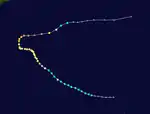1953 Pacific typhoon season
The 1953 Pacific typhoon season has no official bounds; it ran year-round in 1953, but most tropical cyclones tend to form in the northwestern Pacific Ocean between June and December. These dates conventionally delimit the period of each year when most tropical cyclones form in the northwestern Pacific Ocean.
| 1953 Pacific typhoon season | |
|---|---|
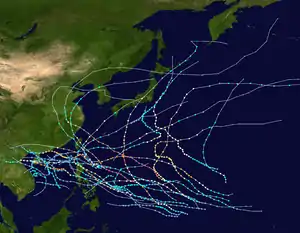 Season summary map | |
| Seasonal boundaries | |
| First system formed | February 18, 1953 |
| Last system dissipated | December 22, 1953 |
| Strongest storm | |
| Name | Nina |
| • Maximum winds | 295 km/h (185 mph) (1-minute sustained) |
| • Lowest pressure | 885 hPa (mbar) |
| Seasonal statistics | |
| Total storms | 24 |
| Typhoons | 17 |
| Super typhoons | 5 (unofficial) |
| Total fatalities | 430 |
| Total damage | Unknown |
| Related articles | |
The scope of this article is limited to the Pacific Ocean, north of the equator and west of the international date line. Storms that form east of the date line and north of the equator are called hurricanes; see 1953 Pacific hurricane season. Tropical Storms formed in the entire west Pacific basin were assigned a name by the Fleet Weather Center on Guam.
Systems
Typhoon Irma
| Typhoon (JMA) | |
| Category 3 typhoon (SSHWS) | |
 | |
| Duration | February 18 – February 25 |
|---|---|
| Peak intensity | 185 km/h (115 mph) (1-min); 980 hPa (mbar) |
This storm weakened and dissipated before it hit the Philippines.
Typhoon Judy
| Typhoon (JMA) | |
| Category 4 typhoon (SSHWS) | |
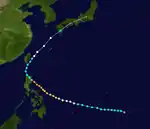 | |
| Duration | May 28 – June 7 |
|---|---|
| Peak intensity | 220 km/h (140 mph) (1-min); 940 hPa (mbar) |
Judy skirted the Philippines[1] and Taiwan then struck the Southern Japanese island of Kyushu. 37 people were killed and 15 were missing.[2]
Tropical Storm 04W
| Tropical storm (JMA) | |
| Tropical storm (SSHWS) | |
 | |
| Duration | June 21 – July 2 |
|---|---|
| Peak intensity | 75 km/h (45 mph) (1-min); 1000 hPa (mbar) |
Super Typhoon Kit
| Typhoon (JMA) | |
| Category 5 super typhoon (SSHWS) | |
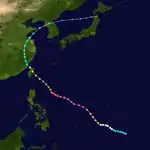 | |
| Duration | June 25 – July 8 |
|---|---|
| Peak intensity | 280 km/h (175 mph) (1-min); 910 hPa (mbar) |
Typhoon Lola
| Typhoon (JMA) | |
| Category 1 typhoon (SSHWS) | |
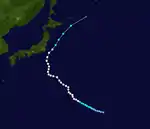 | |
| Duration | July 23 – August 3 |
|---|---|
| Peak intensity | 150 km/h (90 mph) (1-min); 970 hPa (mbar) |
Typhoon Mamie
| Typhoon (JMA) | |
| Category 3 typhoon (SSHWS) | |
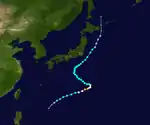 | |
| Duration | July 30 – August 8 |
|---|---|
| Peak intensity | 185 km/h (115 mph) (1-min); 980 hPa (mbar) |
Super Typhoon Nina
| Typhoon (JMA) | |
| Category 5 super typhoon (SSHWS) | |
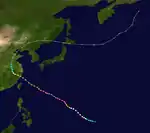 | |
| Duration | August 8 – August 18 |
|---|---|
| Peak intensity | 295 km/h (185 mph) (1-min); 885 hPa (mbar) |
Nina was a major storm. It made landfall in China as a Category 4 tropical cyclone.
Tropical Storm 09W
| Tropical depression (JMA) | |
| Tropical storm (SSHWS) | |
 | |
| Duration | August 9 – August 11 |
|---|---|
| Peak intensity | 85 km/h (50 mph) (1-min); |
Typhoon Ophelia
| Typhoon (JMA) | |
| Category 3 typhoon (SSHWS) | |
 | |
| Duration | August 12 – August 16 |
|---|---|
| Peak intensity | 185 km/h (115 mph) (1-min); 960 hPa (mbar) |
Ophelia hit Hong Kong and Vietnam.
Typhoon Phyllis
| Typhoon (JMA) | |
| Category 1 typhoon (SSHWS) | |
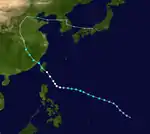 | |
| Duration | August 15 – August 22 |
|---|---|
| Peak intensity | 140 km/h (85 mph) (1-min); 975 hPa (mbar) |
Typhoon Rita
| Typhoon (JMA) | |
| Category 4 typhoon (SSHWS) | |
 | |
| Duration | August 23 – September 2 |
|---|---|
| Peak intensity | 230 km/h (145 mph) (1-min); 940 hPa (mbar) |
Rita hit China as a tropical storm.
Tropical Storm 13W
| Tropical storm (JMA) | |
| Tropical storm (SSHWS) | |
 | |
| Duration | August 26 – August 29 |
|---|---|
| Peak intensity | 100 km/h (65 mph) (1-min); 995 hPa (mbar) |
Typhoon Susan
| Typhoon (JMA) | |
| Category 3 typhoon (SSHWS) | |
 | |
| Duration | September 15 – September 20 |
|---|---|
| Peak intensity | 205 km/h (125 mph) (1-min); 970 hPa (mbar) |
Super Typhoon Tess
| Typhoon (JMA) | |
| Category 5 super typhoon (SSHWS) | |
 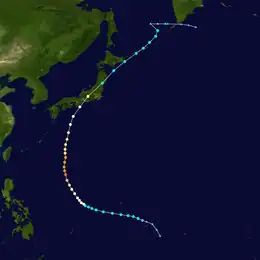 | |
| Duration | September 17 – September 27 |
|---|---|
| Peak intensity | 280 km/h (175 mph) (1-min); 900 hPa (mbar) |
Typhoon Tess struck the Central Honshū Island in Japan. 393 people were killed and 85 were missing.[4]
Tropical Storm 16W
| Tropical storm (JMA) | |
| Tropical storm (SSHWS) | |
 | |
| Duration | September 25 – September 28 |
|---|---|
| Peak intensity | 75 km/h (45 mph) (1-min); 1000 hPa (mbar) |
JMA Tropical Storm 15
| Tropical storm (JMA) | |
 | |
| Duration | October 1 – October 3 |
|---|---|
| Peak intensity | Winds not specified; 999 hPa (mbar) |
Typhoon Viola
| Typhoon (JMA) | |
| Category 3 typhoon (SSHWS) | |
 | |
| Duration | October 3 – October 8 |
|---|---|
| Peak intensity | 185 km/h (115 mph) (1-min); 965 hPa (mbar) |
Typhoon Winnie
| Typhoon (JMA) | |
| Category 1 typhoon (SSHWS) | |
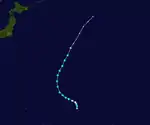 | |
| Duration | October 6 – October 9 |
|---|---|
| Peak intensity | 120 km/h (75 mph) (1-min); 990 hPa (mbar) |
Typhoon Alice
| Typhoon (JMA) | |
| Category 3 typhoon (SSHWS) | |
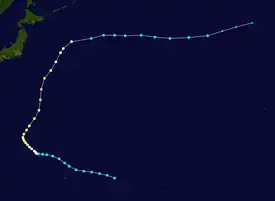 | |
| Duration | October 11 – October 23 |
|---|---|
| Peak intensity | 185 km/h (115 mph) (1-min); 915 hPa (mbar) |
Typhoon Betty
| Typhoon (JMA) | |
| Category 4 super typhoon (SSHWS) | |
 | |
| Duration | October 25 – November 2 |
|---|---|
| Peak intensity | 240 km/h (150 mph) (1-min); 965 hPa (mbar) |
Betty hit Hong Kong and then took an unusual track; going from west to east.
Typhoon Cora
| Typhoon (JMA) | |
| Category 4 typhoon (SSHWS) | |
 | |
| Duration | November 8 – November 20 |
|---|---|
| Peak intensity | 220 km/h (140 mph) (1-min); 960 hPa (mbar) |
Cora crossed the northern Philippines and hit its peak strength, then rapidly weakened and dissipated.
Tropical Storm 22W
| Tropical storm (JMA) | |
| Tropical storm (SSHWS) | |
 | |
| Duration | November 25 – November 29 |
|---|---|
| Peak intensity | 75 km/h (45 mph) (1-min); 1000 hPa (mbar) |
Storm names
|
See also
- 1953 Pacific hurricane season
- 1953 Atlantic hurricane season
- 1953 North Indian Ocean cyclone season
- Australian region cyclone seasons: 1952–53 1953–54
- South Pacific cyclone seasons: 1952–53 1953–54
- South-West Indian Ocean cyclone seasons: 1952–53 1953–54
References
- "Typhoon Skirts Philippines". The New York Times. June 3, 1953. Retrieved January 3, 2021.
- Digital Typhoon: Disaster Information
- "Significant storm surge events in Hong Kong before 1953". www.hko.gov.hk. Retrieved 2020-08-11.
- "Digital Typhoon: Typhoon 195313 (TESS) - Disaster Information". agora.ex.nii.ac.jp. Retrieved 2020-08-30.

